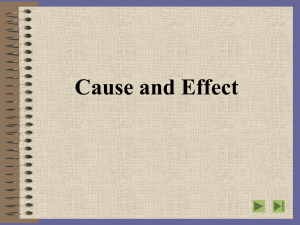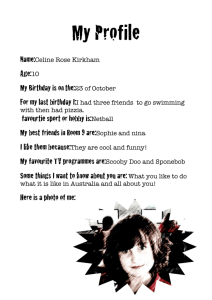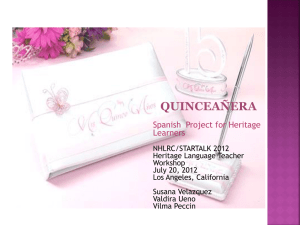El Campeonato de Balero Spanish – 6th Grade 3rd thru 8th Grade
advertisement
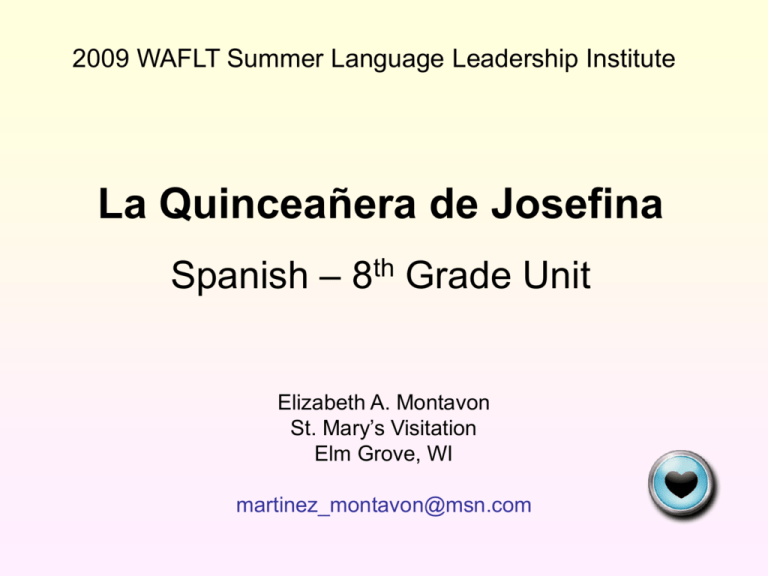
2009 WAFLT Summer Language Leadership Institute La Quinceañera de Josefina Spanish – 8th Grade Unit Elizabeth A. Montavon St. Mary’s Visitation Elm Grove, WI martinez_montavon@msn.com St. Mary’s Visitation •K4-8th grade •330 students •Two classes at each grade level All students in grades 3-8 take Spanish •Grades 3-5 •2 days per week - 30 min per day •Grades 6-8 •3 days per week - 42 min per day 6th Grade Units (Essential Language for the Classroom) Puppet Making (following directions) Our Lady of Guadalupe (Cultural Celebrations) Balero Championship (Hobbies, Interests, Teams, etc.) Restaurant (Serving and Eating Out) 3rd – 5th Grade 7th Grade Units Self Family Community Cultural Celebrations (Essential Language for the Classroom) I am an Artist (Who am I?) School Let’s Go to the Movies Family Activities 8th Grade Units (Essential Language for the Classroom) Daily Routines La Quinceañera (Family & Cultural Celebrations) A New City Fashion & Shopping How do I decide what to teach? Standards Mindset •Know the STANDARDS or where to find them •Know your students Proficiency level (leads to KEY QUESTIONS) Knowledge base •What do you want students to be able to do? What are Standards for my subject area? • Statements about what we want students to be able to do • Performance Goals p. 32, Planning Curriculum for Learning World Languages - DPI Key Question – Beginning Ex: Who am I? Who are you? •Developmental proficiency level •Name, list, identify, provide concrete information, etc. •Broad thematic context •Biographical information, family, community, school, hobbies, friends, climate, countries, etc. THE CURRICULUM PLANNING TEMPLATE! •Pick a theme and a topic that correspond with the key questions •The theme & topic provide the cultural context •Write performance goals for the three modes of communication and enter the corresponding standards Broad Theme: Self and family in the community – family and community traditions La Quinceañera Una Quinceañera La Quinceañera de Josefina (Josefina’s 15th Birthday) •Virtual environment: members of an extended family come together to celebrate Josefina’s birthday •Each student acquires a virtual identity as a relative of Josefina, or a godparent, or her friend •Activities are carried out using the student’s virtual identity La Invitación Thematic Curriculum Unit—Performance Assessment and Planning Guide Key Question: Who am I? Theme: Self & Family in the Community Topic: La Quinceañera (Family & Family Celebrations) Targeted Proficiency Level: Beginning Developing Transitioning Refining *Interpersonal Interpretive Presentational Interpersonal *Interpretive Presentational Interpersonal Interpretive *Presentational Converse with a classmate, asking and answering questions about what family members are doing in preparation for and during a family event. Read and/or listen to an article or story about family members and answer questions. Create an invitation to a 15th birthday celebration & create a slide narration to present “family members” in action. Wisconsin Standards: Communication A1 Conversation A2 Questions A5 Comprehension B2 Listening (media) B3 Reading (with visual support) B4 Reading (authentic materials) C2 Students will write and present a short narrative about their “family” C5 Forms of writing Target Performance (Key elements from the Performance Guidelines to consider in rubric development) Content: Uses thematic vocabulary and memorized phrases. Responds automatically to high-frequency cues and can ask memorized questions Content: Can determine meaning of family-related content by recognition and use of cognates and knows prefixes/base words Content: Can write sentences & simple paragraphs; can memorize and speak in sentences about family-related activities Communication Mode: Performance Assessment Accuracy: Can speak in sentences in the appropriate tense Accuracy: Can write accurate sentences & simple paragraphs & pronunciation is understandable Thematic Curriculum Unit—Performance Assessment and Planning Guide Continued Target Performance (Key elements from the Performance Guidelines to consider in rubric development) (continued from previous page) Communication Strategies: Asks for clarification; focuses on successful task completion. Communication Strategies: Understands short, simple narratives. Communication Strategies: Focuses on successful task completion. Cross-Cultural Applications: Imitates appropriate linguistic patterns (tú & usted) Cross-Cultural Applications: Begins to use some knowledge of the target culture to interpret text. Cross-Cultural Applications: Imitates appropriate linguistic patterns Continued Thematic Curriculum Unit—Performance Assessment and Planning Guide Links to Culture and the other Wisconsin Standards: ✓ Connections ✓ Comparisons ✓ Communities Evidence (How these standards are incorporated in the instruction) Structures and Vocabulary: What needs to be taught for students to be successful in the performance assessment Culture: D Practices D1 Patterns of Interaction: Students will observe and imitate appropriate patterns of behavior (greetings, gestures, etc.) D2 Cultural Activities: Students will participate and learn about the Quinceañera celebration Comparisons: H Language H1 Structures: Students will identify cognates (words similar to English), word roots, prefixes, suffixes, and sentence structure to derive meaning. H4 Cultural Characteristics: Students will identify cultural characteristics of language such as formalities, levels of politeness, informal and formal language—Hispanic last names (father & mother) Compare and contrast with sweet sixteen rituals. Connections: G Added perspective G1 Popular Media: Students will read, view, listen to, and talk about subjects in popular media from other countries in order to gain a perspective on other cultures. (Use of internet sources for historical & popular culture information on the Quinceañera celebration) G2 Accessing Resources: Students will access information in Spanish in order to gain greater insight about other cultures and/or own—Quinceañera websites Communities: K Personal Enrichment K4 Further learning: Use local resources to find out about Quinceañera activities in the Milwaukee area community. Maintain a conversation & provide information using high frequency & thematic vocabulary Use the names of family relatives—mother, father, brother, sister, aunt, uncle, etc. Ask & answer questions (question words) Use personal adjetives: mi, mis, tu, tus, su, sus, nuestro, nuestros, nuestra, nuestras. Use numbers from 1 to 100 to talk about dates and ages Use the months of the year Provide information about family celebrations (birthdays, weddings, saint’s days, etc.) Use appropriate language conventions to provide information: Use estar + an adjective; Use present progressive forms (estar + _ando, _iendo, _yendo) Tell a story using sentences & simple paragraphs Use editing tools (dictionary, proofreading, etc.) for writing Performance Goals Interpretive Interpersonal Presentational Read and listen to a story about family members and identify the main idea and supporting details. (Online) Converse with a classmate, asking and answering questions about what family members are doing in preparation for and during family event. (Video) Create an invitation to a 15th birthday celebration & create a slide narration to present “family members” in action. Interpersonal Converse with a classmate, asking and answering questions about what family members are doing in preparation for and during a family event. Communication A1 Short conversations on familiar topic A2 Questions: Students will ask & answer questions A5 Comprehension: Repeat or ask for repetition to ensure understanding Content: Uses thematic vocabulary and memorized phrases. Responds automatically to high-frequency cues and can ask memorized questions. Accuracy: Can speak in sentences in the appropriate tense. Communication Strategies: Asks for clarification; focuses on successful task completion. Cross-Cultural Applications: Imitates appropriate linguistic patterns Interpretive Read and/or listen to an article or story about family members and answer questions. Communication B1 Listening: understand spoken language on familiar topics with strong visual support B3 Reading: Students will understand written material on a familiar topic with strong visual support B4 Reading: Students will understand the main idea of authentic materials Content: Can determine meaning of family-related content by recognition and use of cognates and knows prefixes/base words. Accuracy: Can copy memorized language with accuracy, and will begin to notice some errors. Communication Strategies: Understands short, simple narration with highly predictable and familiar contexts. Cross-Cultural Applications: Begins to use some knowledge of the target culture to interpret text. Presentational Create an invitation to a 15th birthday celebration & create a slide narration to present “family members” in action. Communication C2 Students will write and deliver a short narrative about their “family” C5 Forms of writing: Students will write a short narrative Content: Can write sentences & simple paragraphs; can memorize and speak in sentences about family-related activities La Última Muñeca Recuerdos Accuracy: Accuracy: Can write accurate sentences & simple paragraphs & pronunciation is understandable Communication Strategies: Focuses on successful task completion. Cross-Cultural Applications: Imitates appropriate linguistic patterns Culture: D Practices D1 Patterns of Interaction: Students will observe and imitate appropriate patterns of behavior (greetings, gestures, etc.) D2 Cultural Activities: Students will participate and learn about the Quinceañera celebration Comparisons: H Language H1 Structures: Students will identify cognates (words similar to English), word roots, prefixes, suffixes, and sentence structure to derive meaning. H4 Cultural Characteristics: Students will identify cultural characteristics of language such as formalities, levels of politeness, informal and formal language—Hispanic last names (father & mother) Compare and contrast with sweet sixteen rituals. Connections: G Added perspective G1 Popular Media: Students will read, view, listen to, and talk about subjects in popular media from other countries in order to gain a perspective on other cultures. (Use of internet sources for historical & popular culture information on the Quinceañera celebration) G2 Accessing Resources: Students will access information in Spanish in order to gain greater insight about other cultures and/or own—Quinceañera websites Communities: K Personal Enrichment K4 Further learning: Use local resources to find out about Quinceañera activities in the Milwaukee area. STRUCTURES & VOCABULARY Maintain a conversation & provide information using high frequency & thematic vocabulary: •Use the names of family relatives—mother, brother, aunt, etc. •Ask & answer questions (question words) •Use personal adjetives •Use numbers from 1 to 100 to talk about dates and ages •Use the months of the year •Provide information about family celebrations Use appropriate language conventions to provide information •Use estar + an adjective •Use present progressive forms (estar + _ando, _iendo, _yendo) •Tell a story using sentences & simple paragraphs •Use editing tools (dictionary, proofreading, etc.) for writing Performance Goals Interpretive Interpersonal Presentational Read and listen to a story about family members and identify the main idea and supporting details. (Online) Converse with a classmate, asking and answering questions about what family members are doing in preparation for and during family event. (Video) Create an invitation to a 15th birthday celebration & create a slide narration to present “family members” in action. Interpretive Task: Read a story about family members and answer questions. Interpretive Task Please read the story “La Tamalada” by Carmen Lomas Garza and answer the questions. Be specific! Comprehension (Interpretive) A B C D&U IDENTIFY THE MAIN IDEA I easily identified the main idea I came very close to identifying the main idea I had some difficulty identifying the main idea I had only a slight hunch about the main idea or could not identify it IDENTIFY SUPPORTING DETAILS I correctly identified four or more details I correctly identified at least three details I correctly identified two or more details I correctly identified one detail or could not identify any details Spontaneous Conversation Task: Converse with a classmate, asking and answering questions about what family members are doing in preparation for and during a family event. You will each receive a photo card with the following information: •Full name •Relationship to Josefina •Profession •Birth date •Age on next birthday Spontaneous Conversation Task (cont): Your task is to ask and answer questions about your photo. You must include the following information in your answers: •Full names of relatives •Relationship to Josefina (all relationships on the family tree) •What the person is doing in the photo (see list of family celebration activities – verbs) •What the person is feeling (see list of common emotions – adjectives) •Profession (see list of common professions) •Birthday (all months and 1-31) •Age on next birthday (1 to 100) Cecilia Martínez González Josefina’s aunt Architect Birthday – January 14 37 on next birthday Rosa Gómez Martínez Josefina’s cousin Student - 6th grade Birthday – April 25 12 on next birthday Santiago Campos Castillo Josefina’s escort Waiter Birthday – August 11 23 on next birthday Samuel López Santos Josefina’s uncle Engineer Birthday – October 31 33 on next birthday INTERPERSONAL Spontaneous Conversation Video Assessment 8th – Spontaneous Conversation Saludos Introduce family member Ask and answer questions about: • Relationship to Josefina • Profession • Birthday • Age on next birthday • What is the person doing? • How is the person feeling? Despedidas Example of Prompt taped to tripod Example 1 Example 2 Example 3 Spontaneous Conversation Conversation Skills Fluency & Vocabulary Pronunciation & Grammar U-D C-B A Does not show much interest in the conversation; does not make much effort to understand or be understood. Shows some interest in the conversation and makes some effort to understand or to be understood. Shows interest in the conversation. Makes an effort to be understood and makes an effort to understand. Shows constant hesitation and uses limited vocabulary related to the topic. Speaks slowly with some hesitation and uses basic vocabulary to cover the topic. Uses smooth flowing speech and makes an effort to use a variety of expressions and descriptive vocabulary. Uses incorrect or English pronunciation and makes grammar errors that interfere with communication. Makes some effort to sound like a native speaker and makes several grammar errors that do not interfere with being understood. Makes an effort to sound like a native speaker and makes only minor grammar errors that do not interfere with being understood. TO SHOW INTEREST IN THE CONVERSATION – Look at your partner, respond to what your partner says, prompt your partner as needed. Presentational Task: Create a slide narration to present “family members” in action You and your partner must include the following information in your PhotoStory3 narration: • Full names of people in the photo • Relationship to Josefina • What each person is doing at the moment (a form of estar + verb w/ _ando, _iendo, or _yendo) • How each person is feeling Practice and get feedback on pronunciation before recording. Morning Class Presentation Afternoon Class Presentation Presentation of Narration (Presentational) A B C D&U CONFIDENCE My presentation was communicated with confidence I communicated with a little uncertainty and hesitation I had some difficulty communicating my ideas I had a very difficult time communicating my ideas EFFECTIVENESS My presentation was easily understood My presentation was mostly easy to follow My presentation was a little hard to follow My presentation was difficult to follow FLUENCY I used complete Spanish sentences and covered most of the topic I used many Spanish sentences on the topic I used simple Spanish sentences on the topic (some incomplete) with some English I used only a few or incomplete Spanish sentences on the topic; I used English frequently GRAMMAR I made few grammar errors I made some grammar errors I made many grammar errors I made very many grammar errors Planning Instruction Teacher Guided •Small chunks of language •Oral games & activities •Guided writing practice Student Produced •Spontaneous conversation •Write without Spanish prompts From Teacher Guided to Student Produced 8-week unit – 3 classes per week (24 classes) •5-week unit – 5 classes per week (25 classes) •Use tiara, film, stories, & internet resources to introduce the unit •Present or discover vocabulary using film, stories & internet resources; include vocab required for assmts & invitations •Discover identities after necessary vocabulary is learned (family vocabulary & who is/who are/I am) •Practice phrases, then sentences every class period using oral exchanges, SmartBoard & computer activities •Class presentations of language structures & PhotoStory3 skills •Assign work partners & photos •Class work time for invitations, narrations, recording and editing •Continually assess via class activities or internet activities & provide feedback Multiple Intelligences Unit Planning Template Unit: La Quinceañera Level: 8th Grade - Beginning Interpersonal Task: Spontaneous conversation with a partner Interpretive Task: Read a story and identify main idea & details from the story Presentational Task: Write & present a slide narration & and create a birthday invitation Verbal / Linguistic Logical / Mathemati cal Visual / Spatial Bodily / Class Activities Write/present a slide narration Identify thematic vocabulary on Quinceañera websites Identify autobiographical information from an article (interpretive) Solve brain teasers about family ties; use Photostory 3 software to create a photo story Use family tree to identify family relationships Homework Practice vocabulary via the Spanish class page; Use a picture of your own family, an Hispanic family or a family from your own culture for a writing prompt Create a graphic organizer for narration pre-writing or Computer Class or “Above & Beyond” Musical / Rhythmic Interpersonal /Social Intrapersonal /Introspective Naturalist Fly swatter game Cut & paste Listen to and sing authentic Quinceañer a songs Song with present progressive : Marcha de las Canicas Activity to “discover’ family identity; card exchanges for Q &A Spontaneous conversation interpersonal) Reflect on language and performance goals Check off items on the “I can…” checklist Semantic mapping exercise – prewriting Practice the waltz or the paso doble or a group dance routine Make up a chant or song using present progressive verbs or feelings vocabulary; Listen to 15 songs on the internet Prepare food item with classmates to bring to Quinceañera celebration Keep a journal of language learned Kinesthe tic I CAN STATEMENTS I can track my learning progress in the Quinceañera unit by checking off the things I can do and reviewing, practicing and/or getting extra help with the things I am unsure about or cannot yet do. What now? •Choose an engaging family theme from the culture of the world language that you are teaching and design your own unit. •Go to …. to download the plans and activities for this unit. ©Mark Parisi – from ACTFL website Marcha de las Canicas Desde el desván rodando van bajando las canicas brincando escalón por escalón, sin ton ni son, saltando libres y locas. Allá se van sin nadie que pudiera perseguirlas huyendo por el gusto de correr y de brincar con sus rebotes de cristal. Cri-Cri Eugenia León Francisco Gabilondo Soler (Cri-Cri) SEMANTIC MAPPING 1. Write target topic on board 2. Have students brainstorm words related to topic 3. Write/list the words by categories in the form of a map 4. Have the students provide labels for each category (optional) 5. Discuss the words on the semantic map 6. Revise map as needed after discussion 7. Use map to write a story JANA MATHIALAGAN Institute Technology MARA The English Teacher Vol XIX July 1990
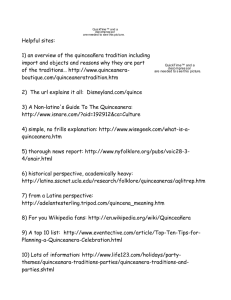
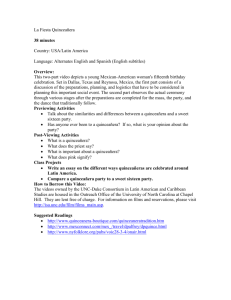
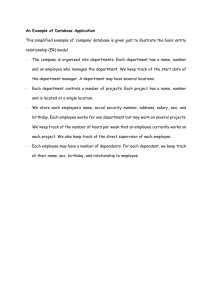

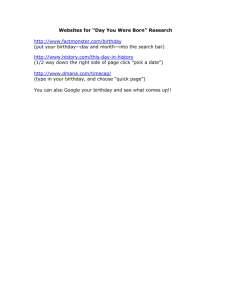
![You`re invited to celebrate [child`s name]`s birthday at SCRAP! What](http://s3.studylib.net/store/data/007177272_1-c15601fb9e11b26854f13f1982e634e8-300x300.png)
